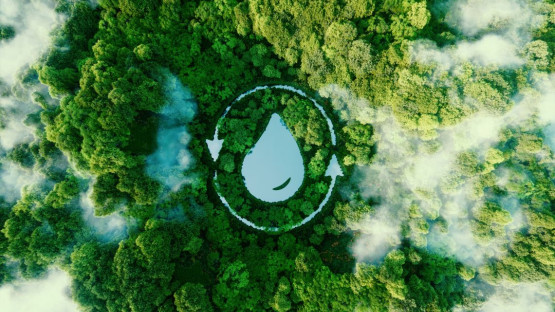On International World Water Day, the theme Water for Peace underscores the pivotal role water plays in fostering global stability and cooperation. Water cooperation refers to the peaceful management and use of freshwater resources by all stakeholders, including across boundaries. The IAEA is spearheading efforts to increase water cooperation through its Global Water Analysis Laboratory (GloWAL) Network initiative.
Harnessing Isotope Hydrology for Water Diplomacy: UN World Water Day 2024
An ecological metaphor for nature's ability to hold and purify water. ((Photo by Malp, Adobe Stock))
Launched at the UN 2023 Water Conference, the GloWAL Network represents a groundbreaking transformation in water analysis, empowering countries to independently generate chemical and isotopic water data. The network fosters collaboration, best-practices, knowledge-sharing and capacity building among laboratories world-wide bridging technical gaps between lower-, middle- and high-income countries . GloWAL’s objectives include enabling independent data generation in low- and middle-income countries, reducing technical disparities, attracting financial investment and promoting scientific innovation in water analysis.
The availability of reliable water data has been consistently identified as a key concern in achieving the Sustainable Development Goal 6 (SDG6) of ensuring access and sustainable management of water and sanitation for all. Laboratory services capable of generating timely and accurate data are crucial for understanding and managing water resources and supporting national water governance. The GloWAL Network seeks to address these concerns by placing the power of data generation in the hands of countries.
Prosperity and peace rely on water
Water cooperation can be a powerful tool for science diplomacy. Instances of cooperation over water that nurtured peaceful collaboration have historically extended beyond water-related issues and acted as a stabilizing force and catalyst for sustainable development. Water cooperation, both within and between countries, can pave the way for collaboration across all sectors. At the local and national levels, integrated water resources management and a circular economy approach are promoted. At the basin level, countries are encouraged to develop agreements and institutions for the peaceful management of transboundary water resources.
As climate change, population growth and water scarcity intensify, placing immense pressure on food supply, the need for sustainable water management becomes increasingly urgent. Only 0.5 per cent of earth's water is available as freshwater and climate change poses a significant threat to this vital resource. The IAEA’s commitment to make a positive impact towards a sustainable and equitable water future aligns with the Paris Agreement's adaptation goals.
The celebration of the UN World Water Day 2024 is an opportunity to once again recognize the critical role of water cooperation in advancing the 2030 Agenda for Sustainable Development. The IAEA, through initiatives like the GloWAL Network, exemplifies its commitment to empowering nations, fostering cooperation, and promoting water's pivotal role in global peace and prosperity.




